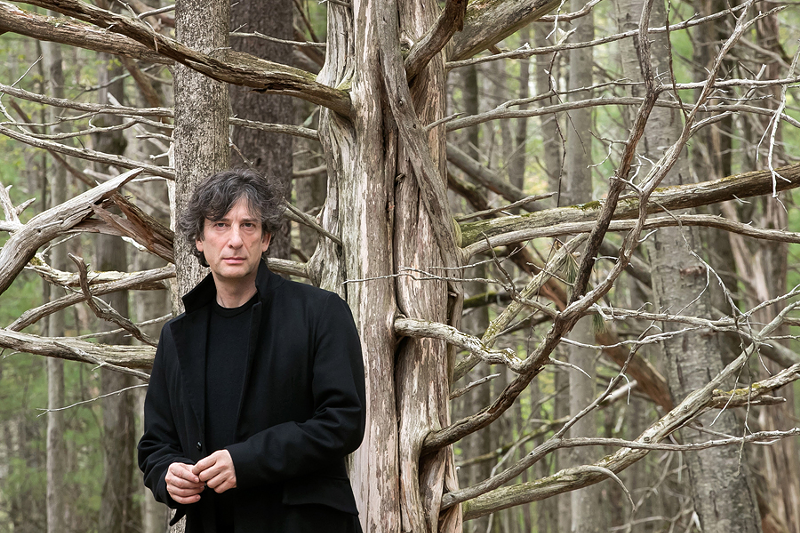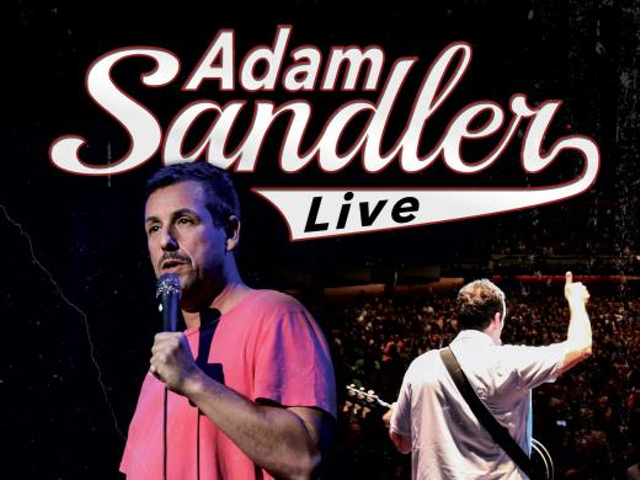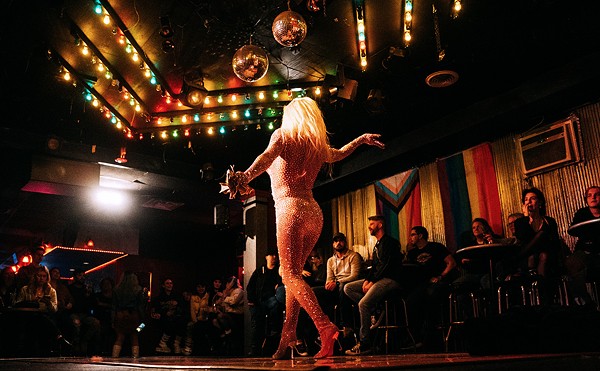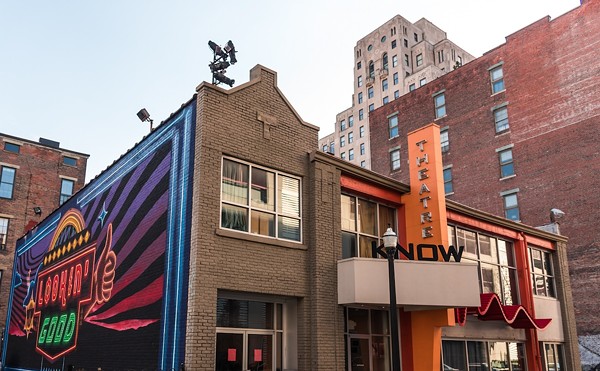Several years ago, I was freelancing for the New Haven Advocate under the able editorship of former CityBeat minion John Stoehr. John emailed me one afternoon with an intriguing query: Would it be possible to get an interview with Lady Gaga to preview her upcoming concert? After several incapacitated moments of convulsive laughter, I responded to John’s request thusly: “Lady Gaga doesn’t need you, me or God to help her sell tickets.” I offered to do a “think piece” instead.
The situation seems to be largely the same with science fiction author/graphic novelist Neil Gaiman, whom I was asked to interview if possible, although the reasons are not as clearly obvious as in Gaga’s case. He’s appearing 7 p.m. Thursday at the Aronoff Center for the Arts, in support of the Public Library of Cincinnati and Hamilton County, and it is sold out. And he’s not doing interviews.
So what exactly is it about the 57-year-old Gaiman that inspires his public to attend his appearances in such numbers, thereby allowing him the luxury of not dealing with the unwashed press, i.e., me?
First of all, he’s British (so cool), has two middle names (Richard MacKinnon), and he’s married to singer/songwriter Amanda Palmer (also known as Amanda Fucking Palmer). Before we wander too far into the vast expanse of Gaiman’s almost unbelievable résumé — it would be completely plausible if it was revealed that he had been Chuck Barris’ child partner in the CIA — there is a bullet point in his credits that warrants italics: He’s written two episodes of Doctor Who!
In the geekiest corners of wild geekdom, that factoid alone could account for at least a portion of the slavish, standing-room-only crowds that fill his live readings. If Gaiman had never done another thing beyond contributing to the good doctor’s mythology, he could have repaired to his mother’s basement and played Halo and World of Warcraft endlessly, always within easy reach of a garbage bag full of Cheetos, a 10-gallon reservoir of Mountain Dew and a bong, all of it financed by Doctor Who fans that have constructed shrines to those very scripts in their mothers’ basements.
Of course, those episodes have been more recent developments in Gaiman’s literally storied career, coming along in 2011 and 2013. His first Doctor Who episode went on to win a Hugo Award, science fiction’s highest accolade, an honor that Gaiman has now won six times. He was once nominated for his 2006 novel Anansi Boys, but he requested that the nomination be withdrawn on the grounds that the book was more fantasy than science fiction. That’s a shame, because with a seventh punch on his Hugo card, he’d get a free dinner at Douglas Adams’ Restaurant at the End of the Universe. Oh well, there’s always next year. And every year after that.
And since the subject of awards has been broached, it’s safe to imagine that Gaiman’s home or homes must be trophy rooms with attached garages. In addition to the aforementioned Hugos, he has won multiple awards from a variety of august ceremonies, including the Nebula, Locus, Harvey, Eisner, Bram Stoker, Ray Bradbury, Shirley Jackson and British Fantasy Awards, among many others. Gaiman has been recognized for every facet of his writing, from his groundbreaking Sandman series of graphic novels to short stories to novellas and novels. He won both the Newbery and Carnegie medals for his 2009 young adult novel The Graveyard Book, the first author to achieve that milestone. It seems like the only organization that hasn’t bestowed some mantle bling on Gaiman over the past quarter century is the Lollipop Guild, and he probably asked them to withdraw their nomination too.
Let’s not forget that there are a number of film and television entries on Gaiman’s curriculum vitae as well. He wrote all six episodes of the darkly inventive Neverwhere, broadcast on the BBC in 1996, and he wrote the series’ novelization. Know Theatre presented a very popular stage version of the novel last year. Gaiman co-wrote the script for Robert Zemeckis’ modern interpretation of Beowulf. He’s written several treatments that are in various stages of the film process and several of his novels and novellas have been translated to screens both big and small, including Stardust and Coraline for the former and American Gods for the latter. And then there’s another one of those career highlight moments — voicing himself on The Simpsons in 2011.
Gaiman’s influence also creeps into the musical realm. One of his first books in the mid ’80s, back when he was still a journalist, was a biography of Duran Duran (given the choice between three musical acts to write about, he recently said he chose the New Romantic superstars over Barry Manilow and Def Leppard because they had less of a history). He’s also close friends with singer/songwriter Tori Amos, who has written Gaiman and his books, stories and characters into several songs and even asked him to be her daughter’s godfather. He frequently tours with Palmer, and even released a collaborative live album with her in 2013. His writing bears all the earmarks of a life enthralled by Rock — iconoclastic, anti-authoritarian, brash, electric, visionary. Gaiman’s teenage Punk band was fueled by his love of the Velvet Underground in general and Lou Reed in particular; the appreciation he wrote for The Guardian after Reed’s passing —where he claims that Sandman would never have shimmered into existence without Reed and his work — is as impassioned and moving as anything in his fiction portfolio.
It’s logical to assume that Gaiman doesn’t feel the need to speak to his fans through the press because he speaks to his fans directly; he has over two million Twitter followers and was cited by IGN Entertainment in 2013 as one of the best tweeters in the comics industry. He also routinely corresponds with fans through his Tumblr account.
The only remaining question may be why Gaiman has as many fans as he does, but if any or all of the above clarifies anything, it’s the fact that he doesn’t attract just one type of zealot. Comic books, Doctor Who, science fiction, fantasy, television, film, The Simpsons, music . . . all of these obsessives have found a brilliant champion in Neil Gaiman. All things considered, I wouldn’t talk to me either.






